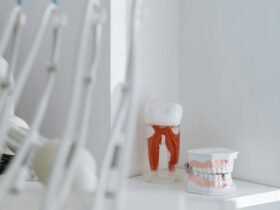Imagine you’re out for a delightful afternoon tea at a charming Camden Cafe, relishing a slice of their famous lemon poppy seed cake. Suddenly, as you take a bite, you feel a disconcerting shift. Your dentures come loose, threatening to slip out entirely. This scenario, while undoubtedly flustering, is a common occurrence for denture wearers. Fortunately, with a little knowledge and some quick thinking, you can navigate an emergency denture repair situation without undue worry.
This guide serves as your one-stop resource for all things related to emergency denture repair in Camden. We’ll examine the various kinds of denture emergencies, look at different repair methods (temporary and permanent), and provide you the information you need to decide which repair option is best for you.
Denture Emergencies: When Smiles Turn Sideways
Denture emergencies can manifest in several ways, each requiring a specific approach. Here’s a breakdown of the most common denture mishaps:
• Broken Dentures: A broken denture can range from a minor crack in the acrylic base to a complete shattering. If the damage is significant or affects the fit of the denture, seeking professional repair is crucial.
• Cracked Acrylic: Minor cracks in the acrylic base may not necessitate immediate repair. However, if the crack is deep or poses a risk of further breakage, consulting a denture clinic is recommended.
• Loose Teeth: Over time, dentures can loosen due to natural bone shrinkage. This can be remedied through a process called relining, where a new layer of material is added to the base of the denture to improve fit.
• Lost Dentures: A misplaced denture can be a stressful experience. Check your usual places first, and retrace your steps if necessary. Consider contacting the last place you remember having them.
• Misplaced: Dentures can be surprisingly easy to misplace. Check familiar locations like nightstands, sink vanities, and even refrigerator crisper drawers.
• Stolen: While uncommon, dentures can be stolen. If you suspect theft, file a police report and contact your dentist or a denture clinic immediately to discuss replacement options.
Repair Techniques: From DIY Fixes to Professional Solutions
There are two main approaches to denture repair: temporary fixes and permanent repairs.
Temporary Fixes
• Dental Wax: For loose dentures, dental wax can provide a temporary solution. Apply a small amount of wax to the denture base where it touches the gums, creating a tighter fit. It’s important to note that dental wax is a temporary fix and should not be a long-term solution.
• Super Glue (Use with Caution): While tempting as a quick fix, using super glue to repair dentures is generally discouraged by dental professionals. Superglue can damage the acrylic and potentially release harmful chemicals. If you must resort to a temporary fix, consult your dentist for guidance on appropriate adhesives.
Permanent Repairs:
• Acrylic Resin: For more permanent repairs, such as fixing cracks or chipped teeth, acrylic resin is the material of choice. Denture repair kits containing acrylic resin and bonding agents are available for purchase, but the success of a DIY repair depends on your dexterity and the severity of the damage. In most cases, seeking professional help from a denture clinic is advisable.
• Metal Reinforcement: In situations where the denture base has fractured extensively, a dental professional may recommend metal reinforcement for added stability during repairs.
Repair Providers: Finding the Right Fit for Your Needs
When faced with a denture emergency, several repair options are available in Camden:
Denture Clinics:
Denture clinics specialize in denture fabrication, repairs, and adjustments. They typically have experienced technicians on staff who can assess the damage and recommend the most suitable repair method. Many clinics offer same-day services, minimizing disruption to your daily routine.
Same-Day Service:
If time is of the essence, look for denture clinics offering same-day repair services. This can be a lifesaver for those individuals who rely on their dentures for speaking and eating.
House Calls:
Some denture clinics cater to patients who have difficulty visiting the clinic in person. They may offer house call services, where a technician travels to your location to assess and potentially repair your dentures.
Dental Laboratories:
While not typically involved in direct repairs for patients, dental laboratories work with dentists and denture clinics to fabricate and repair dentures. Understanding the role of dental laboratories provides a broader perspective on the denture repair process.
Tools and Materials: Demystifying Denture Repair
If you’re considering a DIY repair, here’s a quick rundown of the tools and materials you might encounter:
• Denture Repair Kits: These kits typically contain acrylic resin powder, liquid monomer (activator), an applicator brush, sandpaper, and instructions for use. The quality of these kits varies, and some may not be suitable for complex repairs. Always follow the manufacturer’s instructions carefully and consult your dentist if you have any doubts.
• Acrylic Powders: These come in various shades to match the color of your dentures. When choosing a repair kit, ensure the powder shade aligns with your dentures for a natural-looking repair.
• Liquid Monomers: This liquid acts as an activator, causing the acrylic powder to harden. Handle with care, as liquid monomers can irritate the skin and eyes.
• Specialty Tools: For more advanced repairs, specialized tools like denture trimmers and polishing machines may be required. These tools are generally not included in DIY repair kits and are best left to professionals for optimal results.
Cost Considerations: Balancing Budget and Quality
The cost of denture repair depends on several factors, including:
Severity of Damage: Minor repairs like fixing a loose tooth will likely cost less than repairing a fractured denture base.
Repair Method: DIY repairs using kits are generally less expensive than professional repairs at a denture clinic. However, keep in mind that DIY repairs may not be as durable or long-lasting.
Materials Used: The types of materials used, such as the quality of acrylic resin and bonding agents, can influence the cost of repair.
Insurance Coverage:
Private Plans: Some dental insurance plans may offer partial coverage for denture repairs. To find out the terms of the coverage for your particular plan, contact your insurance provider.
Government Programs: Certain government programs, like Medicare, may offer limited coverage for denture repairs under specific circumstances. Consult your program administrator for details.
Out-of-Pocket Expenses:
Repair Fees: Denture clinics typically charge fees based on the time and complexity of the repair. Be sure to inquire about the estimated cost before proceeding with repairs.
Replacement Costs: In cases where the dentures are beyond repair, replacement becomes necessary. Replacement costs can vary depending on the type of denture and materials used.
Preventive Measures: An Ounce of Prevention is Worth a Pound of Cure
Taking proper care of your dentures can significantly reduce the risk of emergencies:
• Proper Denture Care: Regular cleaning with a soft-bristled brush and denture cleanser is crucial. Avoid harsh soaps and abrasive cleaners that can damage the dentures.
• Cleaning Routines: Establish a consistent cleaning routine, brushing your dentures at least once a day and soaking them overnight in a denture solution.
• Storage Techniques: When not in use, store your dentures in a cool, moist environment to prevent them from drying out and warping. A denture bath filled with a cleansing solution is an ideal storage option.
• Denture Modifications: As your mouth naturally changes over time, your dentures may require adjustments or relines to maintain a proper fit. Schedule regular dental checkups to ensure your dentures continue to function optimally.
• Relines and Rebases: Relines involve adding new material to the base of the denture to improve fit, while rebases involve creating an entirely new denture base. Discuss with your dentist which option is most suitable for your needs.
Conclusion
Denture emergencies can be inconvenient and stressful. You can, however, handle these circumstances with more ease and confidence if you are aware of the various repair choices and take preventative action. Remember, numerous qualified denture clinics in Camden are equipped to address your denture repair needs efficiently and professionally. Don’t hesitate to seek professional help, especially for complex repairs, or if you have any concerns about your dentures. With a little knowledge and planning, you can ensure your dentures continue to function effectively and maintain a confident, beautiful smile.










Leave a Reply